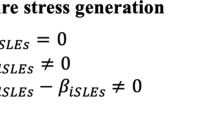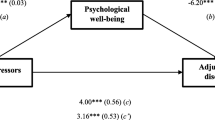Abstract
Current trends in research on stressful life events and disease have been to focus upon other psychosocial factors that may be associated with stress and illness relationships. Recently, the study of relatively minor life events or situations (e.g., daily hassles) has provided a promising alternative avenue of inquiry into basic stress measurement and the relationship of stress to disorder. While initial findings in this area of research appear encouraging, several methodological and procedural issues currently preclude definitive conclusions. The present paper outlines several of the most important limitations of existing research on this topic and provides further data taking these limitations into account for the role of minor life events as predictors of psychological distress. The results of the present prospective study indicate that undesirable minor events (e.g., hassles) significantly predict psychological symptoms, even once initial symptom status is controlled for statistically. Additionally, hassles were uniformly better predictors of subsequent psychological symptoms than were major life event categories; potentially important interactive effects (e.g., hassles x prior symptoms; hassles x prior major events) were also tested and their implications are discussed. Finally, basic associations between major and minor events were examined. The findings are discussed specifically in the context of recent advances in this area and more generally in relation to clarifying our understanding of psychosocial predictors of disorder.
Similar content being viewed by others
References
Bartlett, F. (1932).Remembering: A Study of Experimental and Social Psychology, Cambridge University Press, Cambridge.
Brown, G. (1974). Meaning, measurement, and stress of life events. In Dohrenwend, B. S., and Dohrenwend, B. P. (eds.),Stressful Life Events: Their Nature and Effects, Wiley, New York.
Cleary, P. J. (1980). A checklist for life event research.J. Psychosom. Res. 24: 199–207.
Cohen, J. (1978). Partialed products are interactions; partialed powers are curve components.Psychol. Bull. 85: 858–866.
Cohen, J., and Cohen, P. (1978).Applied Multiple Regression/Correlation Analysis for the Behavioral Sciences, Erlbaum, Hillsdale, N.J.
Derogatis, L. R., Lipman, R. S., Rickels, K., Uhlenhuth, E. H., and Covi, L. (1974). The Hopkins Symptom Checklist (HSCL): A measure of primary symptom dimensions. In Pichot, P. (ed.),Psychological Measurements in Psychopharmacology. Modern Problems in Pharmopsychiatry (Vol. 7), Karger, Basel.
Dohrenwend, B. P. (1974). Problems in defining and sampling the relevant population of stressful life events. In Dohrenwend, B. S., and Dohrenwend, B. P. (eds.),Stressful Life Events: Their Nature and Effects, Wiley, New York.
Dohrenwend, B. S., Krasnoff, L., Askenasy, A. R., and Dohrenwend, B. P. (1978). Exemplification of a method for scaling life events: The PERI life events scale.J Health Soc. Behav. 19: 205–229.
Epstein, S. (1979). The stability of behavior: On predicting most of the people much of the time.J. Personal. Soc. Psychol. 37: 1097–1126.
Fairbank, D. T., and Hough, R. L. (1979). Life event classifications and the event-illness relationship.J. Hum. Stress 5: 41–47.
Goldberg, D. P. (1972).The Detection of Psychiatric Illness by Questionnaire, Oxford University Press, New York.
Holmes, T. S., and Holmes, T. H. (1970). Short-term intrusions into the life style routine.J. Psychosom. Res. 14: 121–132.
Holmes, T. H., and Rahe, R. H. (1967). The social readjustment rating scale.J. Psychosom. Res. 11: 213–218.
Jenkins, C. D. (1979). Psychosocial modifiers of response to stress.J. Hum. Stress 5: 3–15.
Jenkins, C. D., Hurst, M. W., and Rose, R. M. (1979). Life changes: Do people really remember?Arch. Gen. Psychiat. 36: 379–384.
Johnson, J. H., and Sarason, I. G. (1979). Moderator variables in life stress research. In Sarason, I. G., and Spielberger, C. D. (eds.),Stress and Anxiety (Vol. 6), Halsted Press, New York.
Kanner, A. D., Coyne, J. C., Schaefer, C., and Lazarus, R. S. (1981). Comparison of two modes of stress measurement: Daily hassles and uplifts versus major life events.J. Behav. Med. 4: 1–39.
Lazarus, R. S. (1980). The stress and coping paradigm. In Eisdorfer, C., Cohen, D., and Kleinman, A. (eds),Conceptual Models for Psychopathology, Spectrum, New York.
Lazarus, R. S., and Cohen, J. B. (1977). Environmental stress. In Altman, I., and Wohlwill, J. F. (eds.),Human Behavior and the Environment: Current Theory and Research, Plenum, New York.
Lazarus, R. S., Cohen, J. B., Folkman, S., Kanner, A., and Schaefer, C. (1980). Psychological stress and adaptation: Some unresolved issues. In Selye, H. (ed.),Selye's Guide to Stress Research (Vol. 1), Van Nostrand Reinhold, New York.
Lewinsohn, P. M., and Talkington, J. (1979). Studies of the measurement of unpleasant events and relations with depression.Appl. Psychol. Measure. 3: 83–101.
McClean, P. (1976). Depression as a specific response to stress. In Sarason, I. G., and Spielberger, C. D. (eds.),Stress and Anxiety (Vol. 3), Hemisphere, Washington, D.C.
McFarlane, A. H., Norman, G. R., Streiner, D. L., Roy, R., and Scott, D. J. (1980). A longitudinal study of the influence of the psychosocial environment on health status: A preliminary report.J. Health Soc. Behav. 21: 124–133.
Mechanic, D. (1975). Some problems in the measurement of stress and social readjustment.J. Hum. Stress 1: 43–48.
Monroe, S. M. (1982a). Life events and disorder: Event-symptom associations and the course of disorder.J. Abnorm. Psychol. 91: 14–24.
Monroe, S. M. (1982b). The assessment of life events: Retrospective versus concurrent strategies.Arch. Gen. Psychiat. 29: 606–610.
Perkins, D. V. (1982). The assessment of stress using life events scales: A review of current issues. In Goldberger, L., and Brenznitz, S. (eds.),Handbook of Stress, The Free Press, New York (in press).
Rabkin, J. G., and Struening, E. L. (1976). Life events, stress, and illness.Science 194: 1013–1020.
Rahe, R. H. (1978). Life change measurement clarification.Psychosom. Med. 40: 95–98.
Sarason, I. G., de Monchaux, C., and Hunt, T. (1975). Methodological issues in the assessment of life stress. In Levi, L. (ed.),Emotions-Their Parameters and Measurement, Raven Press, New York.
Warheit, G. J. (1979). Life events, coping, and depressive symptomatology.Am. J. Psychiat. 136: 502–507.
Yager, J., Grant, I., Sweetwood, H. L., and Gerst, M. (1981). Life event reports by psychiatric patients, nonpatients, and their partners.Arch. Gen. Psychiat. 38: 343–347.
Author information
Authors and Affiliations
Additional information
This work was supported in part by NIH BRSG Grant S07 RRO7084-14.
Rights and permissions
About this article
Cite this article
Monroe, S.M. Major and minor life events as predictors of psychological distress: Further issues and findings. J Behav Med 6, 189–205 (1983). https://doi.org/10.1007/BF00845380
Accepted:
Issue Date:
DOI: https://doi.org/10.1007/BF00845380




